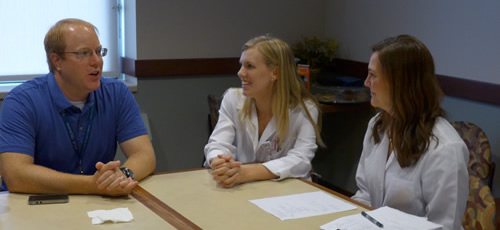Medicine
Medicine Floors
Inpatient rotations on the adult medical floors consist of two blocks in the first, second, and third years—a total of 6 blocks over the 3-year program. These rotations expose residents to a variety of both common and less common problems in adult medicine.
Half of the hospital medicine rotations are on the family medicine continuity service, comprised only of patients from our Highland Family Medicine and Brown Square sites. Continuity residents round on their own patients when admitted to the hospital and collaborate with the inpatient team daily. Care is led by family medicine faculty. The continuity inpatient service has recently initiated a patient census cap to help ensure a balance between work and learning and to help maintain resident wellness. The team is comprised of one first-year resident, one second-year resident, and a third-year supervisor.
The other half of the hospital medicine experience is on a team of family medicine residents caring for patients from other practices in the community. This team is overseen by hospitalists for much of the year but by family medicine faculty for several months of the year as well owing to the number of our faculty who practice hospital medicine. This team is comprised of one first-year resident and a third-year supervisor; in some months there is a second-year resident as well.
Teaching occurs daily during morning report, noon conference (lunch provided), and during sign-out rounds. These conferences are attended by residents of all levels in family medicine, internal medicine and medicine-pediatrics. One morning a week, there is a joint internal medicine-family medicine grand rounds. Informal teaching sessions led by attendings and senior residents occur throughout the week as time allows.
Call is every fourth night until 8:00 p.m. There is no overnight call on medicine; night float residents cover from 8:00 p.m. to 7:00 a.m.
The experience is robust, with many recent program graduates practicing hospital medicine as family medicine faculty or as hospitalists.
Intensive Care Unit
The Medical Intensive Care Unit at Highland Hospital is the setting for training in the management of acute cardiac and pulmonary disease and other complex medical illnesses. A pair of family medicine first-year residents covers the service with supervision by pulmonary/critical care attendings, fellows, and APPs working in the 14-bed unit. There is no overnight call. The nursing staff, along with attending physicians from cardiology, pulmonary, and critical care, provide excellent inpatient teaching for residents. It also offers opportunities to perform critical care procedures. The rotation is 4 weeks, done during the first year of residency.
Night Float
First-year residents do not take night float responsibilities. For one week in the second year, a resident provides cross-cover for patients on non-surgical floors, receiving sign out from the day teams at 8:00 pm and covering until 7:00 a.m. Third year residents admit patients during night float for two weeks.
Cardiology
During this two-week rotation, residents work with the cardiology practice at Highland Hospital and other sites within the University of Rochester system. Residents split their time between outpatient cardiology sessions and seeing patients with the inpatient consultation team. In addition to weekly EKG rounds at Noon Conference at Highland, there are cardiology teaching sessions on inpatient medicine rotations.
Geriatrics
Training in geriatrics is a significant strength of the Family Medicine Residency Program and occurs in one of two designated sites with direct supervision by family medicine geriatric faculty. In addition to providing continuity care for patients in nursing homes, a full block of geriatric medicine in the third year provides training in geriatric mental health care, rehabilitation, comprehensive assessment, and end-of-life care as well as a more intensive experience in day-to-day nursing home care. From clinic patient panels, residents participate in functional assessments and home visits for their elderly patients. In addition, Highland Hospital has a medicine floor devoted entirely to acute care for the elderly. It has become a national model for elder care. In addition to these dedicated experiences, residents gain significant experience caring for older adult patients during their inpatient medicine rotations.
Electives are available for residents with an interest in geriatrics and many of our graduates have gone on to the Geriatrics Fellowship available here at URMC.

Geriatrics Continuity Experience
First- and second-year residents provide continuity of care for nursing home patients at one of two participating community nursing home sites. In this experience, residents learn about the structure of nursing home care, the process for nursing home admissions, and follow-up. Our aim is to provide care that focuses on quality of life and dignity in the nursing home environment.